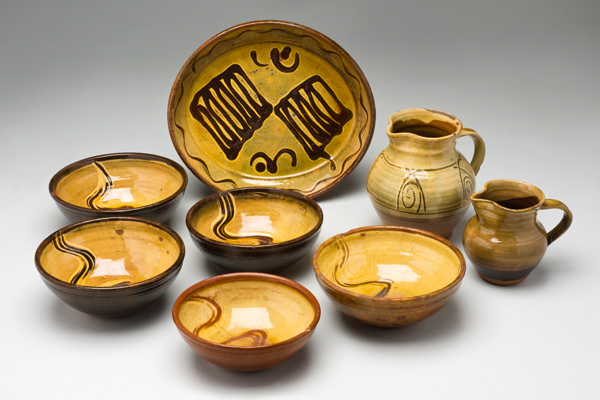Cardew was born of upper-middle-class stock in 1901 — just late enough to avoid being slaughtered in the Great War. Educated at King’s College School and at Exeter College, Oxford, where he read classics, he broke away from the establishment career intended for him to become a potter. He was inspired by the slip-decorated pottery made by Edwin Beer Fishley at his country works. Some of Cardew’s ‘U’ circle took a dim view of his decision. General Douglas Scott, his uncle by marriage, snorted: ‘Disgraceful! A Balliol scholar spending the rest of his life making mud pies.’
Cardew described himself as ‘a mud and water man’. What mattered to him was a ‘clay body’ that was sensual and responsive. It had to feel right to the touch. He loved throwing pots on the wheel. To him the act ‘summed up the business of being human’. The potter’s wheel was like a musical instrument, not just a tool.
Cardew was related to both Kim Philby and Field-Marshal Montgomery
He served an apprenticeship to Leach, who remained a friend. He shared Leach’s admiration for the earthiness of Japanese pottery and the Japanese taste for beguiling imperfections, not for icy shine and exact symmetry. He set up his own pottery at Winchcombe, and married and had three sons; but in 1942, in answer to an approach by the Colonial Office, he left them and went out to the Gold Coast to make pots. He stayed in Africa, with brief leaves in England, for over 20 years; in particular, Tanya Harrod credits him with establishing ‘a national art’ at Abuja in Nigeria in the Fifties.
Cardew was bisexual — predominantly homosexual — and Harrod deals with this aspect of his life far more candidly than he himself was prepared to do in his autobiography. Cardew never got over a schoolboy love affair with a boy called David Owen (no, not that one), which was broken off by Owen. But in Africa he found a ‘great love’, a handsome youth called Clement Kofi Athey, whom he taught — with mixed success — to pot. Back in England, Cardew became a magus of potting, fêted by, and often losing his heart to, young male disciples.
Harrod is the most scrupulous of scholars. Her book is ‘footnoted to the hilt’ — if I may use admiringly a phrase originally intended as pejorative. But she also has the eye of a journalist for glinting, piquant detail. Cardew was related to the spy Kim Philby as well as to Field-Marshal Montgomery. His father was at Magdalen, Oxford with Oscar Wilde, and the two were photographed side by side. Michael loved the poetry of William Blake, Robert Pirsig’s Zen and the Art of Motor-cycle Maintenance, the writings of James Baldwin, underground magazines and gay novels. Angela Carter called him ‘the last sane man in a crazy world’.
It would be possible to view Cardew as a cad for abandoning his wife and young family; or as a snob for turning down a talented rustic as his deputy in favour of a public-school man. But sometimes allowances must be made for monomaniacs. This is how Tanya Harrod’s wonderful book ends:
I began this book in 2001 and now, as I complete it in 2012, a perceived loss of craft skill in Britain is being mourned and debated. The marked disconnect between productive labour and material reward is also being pondered. Michael’s prejudices and passions appear like a map in this new territory. Behold, the hour cometh.






Comments